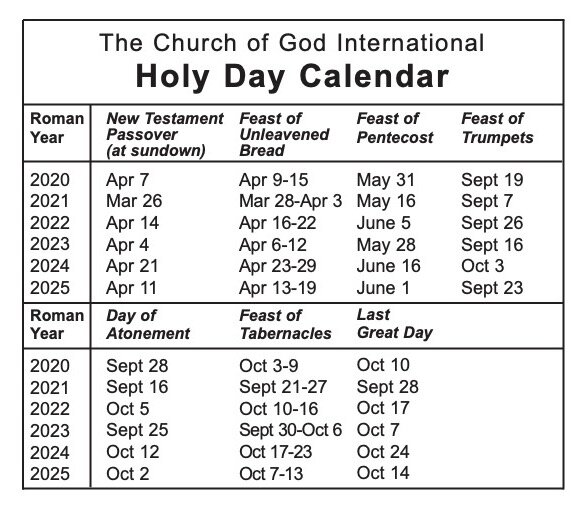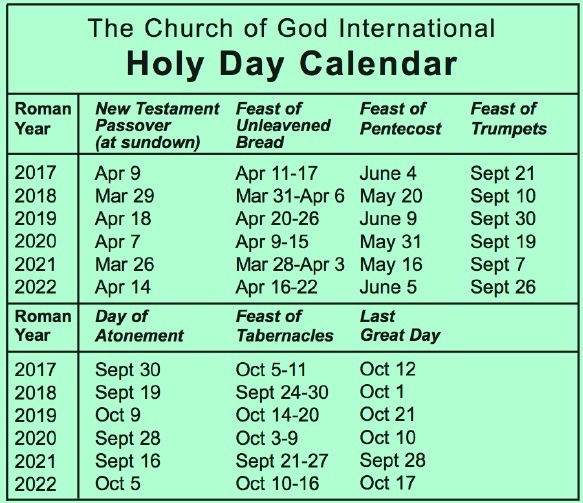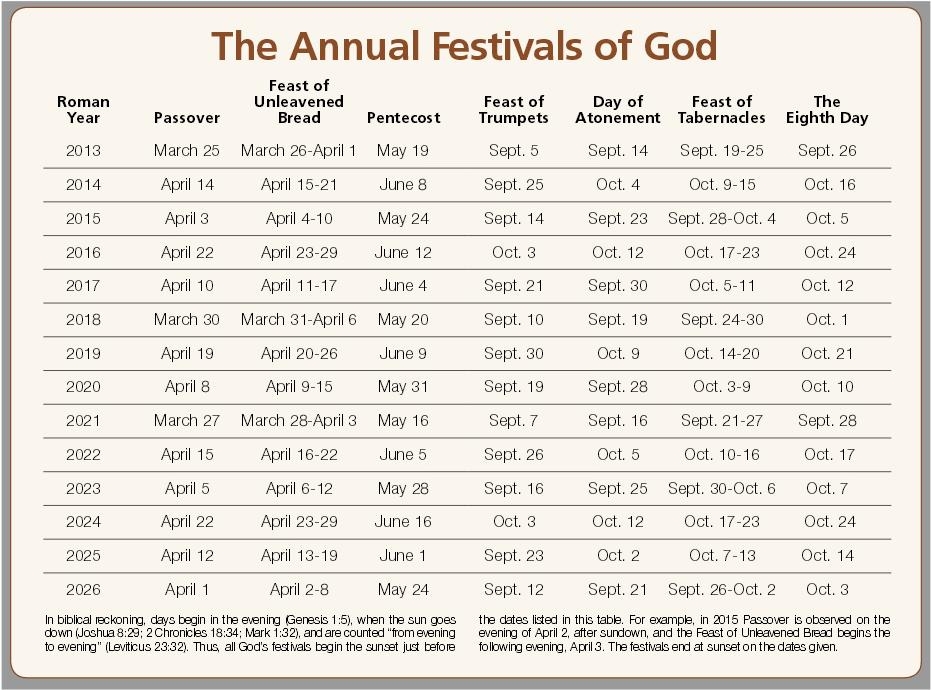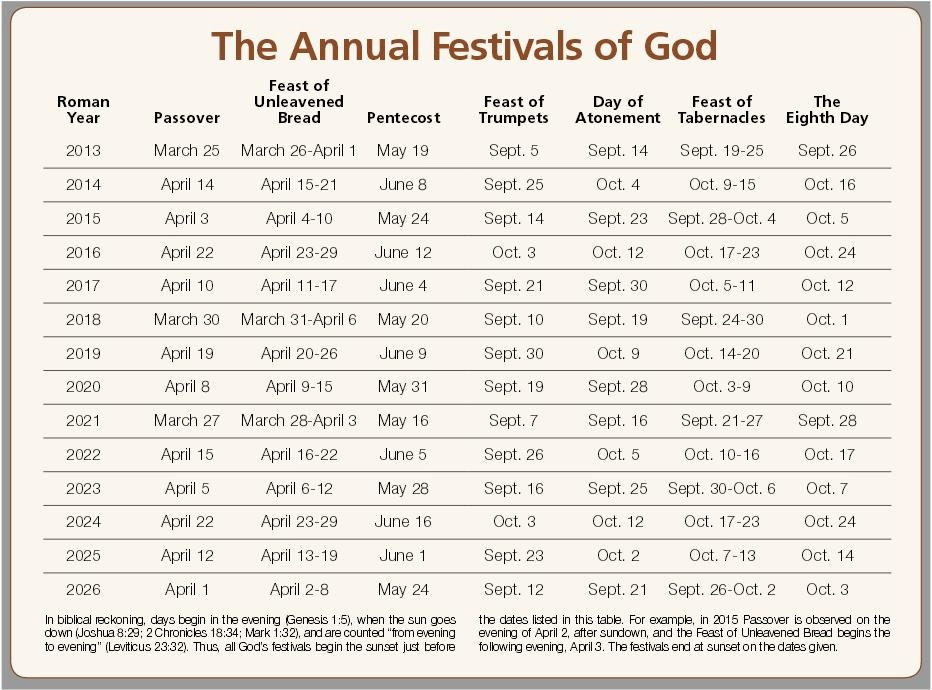Navigating the Sacred: A Deep Dive into the United Church of God’s Holy Day Calendar
Associated Articles: Navigating the Sacred: A Deep Dive into the United Church of God’s Holy Day Calendar
Introduction
With nice pleasure, we’ll discover the intriguing subject associated to Navigating the Sacred: A Deep Dive into the United Church of God’s Holy Day Calendar. Let’s weave attention-grabbing data and supply contemporary views to the readers.
Desk of Content material
Navigating the Sacred: A Deep Dive into the United Church of God’s Holy Day Calendar

The United Church of God (UCG), a global Christian denomination, observes a singular calendar of holy days that distinguishes it from many different Christian church buildings. These observances, rooted in biblical historical past and prophetic interpretation, are central to UCG’s religion and follow, offering a framework for religious development and understanding God’s plan for humanity. This text will discover the UCG holy day calendar intimately, analyzing its origins, significance, and the theological ideas that underpin its observance.
The Basis: Biblical Observance and Prophetic Interpretation
In contrast to many mainstream Christian denominations that primarily give attention to Sunday worship, UCG adheres to a system of observing seven annual holy days, often called the "feast days" or "appointed occasions" talked about in Leviticus 23. These will not be merely commemorative occasions; UCG members imagine they’re divinely ordained appointments designed to attach believers with God and His overarching plan revealed in Scripture. This understanding is deeply rooted within the Previous Testomony, the place God particularly instructed the Israelites to watch these festivals, emphasizing their symbolic and prophetic significance.
The UCG’s interpretation of those scriptures extends past a literal historic context. They imagine the holy days foreshadow key occasions in God’s plan, encompassing humanity’s previous, current, and future relationship with God. This prophetic lens provides a layer of depth and that means to the observances, making them extra than simply historic remembrances. The calendar serves as a roadmap, guiding believers via the narrative of salvation and reminding them of God’s guarantees.
The Seven Holy Days: A Detailed Examination
The UCG’s holy day calendar includes seven distinct observances, every carrying distinctive religious significance:
-
Passover: This commemorates the liberation of the Israelites from slavery in Egypt. For UCG members, it symbolizes God’s deliverance of humanity from sin and religious bondage via the sacrifice of Jesus Christ. The Passover Seder, a ritual meal, is a central a part of the observance, recalling the occasions of the Exodus and pointing in direction of Christ’s sacrifice as the final word Passover Lamb.
-
The Days of Unleavened Bread: Following Passover, this seven-day interval emphasizes the necessity to rid oneself of sin and corruption, symbolized by the removing of leaven (yeast) from one’s dwelling and food plan. It represents religious cleaning and a dedication to a life free from the affect of worldly needs.
-
Pentecost (Feast of Weeks): Noticed seven weeks after Passover, Pentecost commemorates the giving of the Legislation at Mount Sinai and, within the Christian context, the descent of the Holy Spirit upon the apostles. For UCG, it symbolizes the start of the Church and the outpouring of God’s Spirit, empowering believers to dwell a lifetime of religion and repair.
-
Trumpets (Feast of Trumpets): This single-day holy day marks the start of the seventh month within the biblical calendar. It’s a day of solemn meeting, signifying a time of awakening and preparation for the approaching judgments and the return of Christ. The sound of the trumpets symbolizes a name to repentance and a warning of impending occasions.
-
Day of Atonement (Yom Kippur): It is a day of fasting and repentance, a time for looking for forgiveness for sins and reconciliation with God. UCG members view it as a profound alternative for religious introspection and renewal, emphasizing the significance of humility and looking for God’s grace.
-
Tabernacles (Feast of Tabernacles): This eight-day competition celebrates God’s provision for the Israelites throughout their wilderness journey. For UCG, it represents the long run millennial reign of Christ, a time of peace, abundance, and God’s dwelling amongst His individuals. It’s a time of pleasure and anticipation for the approaching kingdom of God.
-
The Final Nice Day: This closing day of Tabernacles is especially important, representing the final word fruits of God’s plan and the institution of His everlasting kingdom. It’s a time of reflection on the fulfilled guarantees of God and the hope of everlasting life.
The Significance of Observing the Holy Days
The observance of those holy days is just not merely a ritualistic act for UCG members; it is a deeply religious expertise that strengthens their religion and fosters a deeper understanding of God’s plan. The calendar supplies:
- A Framework for Non secular Development: The cyclical nature of the holy days supplies alternatives for normal reflection, repentance, and recommitment to God’s lifestyle.
- A Deeper Understanding of Scripture: Learning the historic and prophetic context of every holy day enhances biblical literacy and fosters a richer appreciation for the scriptures.
- A Sense of Neighborhood: Observing the holy days collectively strengthens bonds throughout the UCG neighborhood, fostering fellowship and shared religious experiences.
- A Connection to God’s Plan: The holy days function tangible reminders of God’s guarantees and His ongoing involvement in human historical past.
- A Preparation for the Future: The prophetic significance of the holy days prepares believers for the approaching of Christ and the institution of God’s kingdom.
Variations from Different Christian Denominations
The UCG’s emphasis on observing the biblical holy days distinguishes it from many different Christian denominations. Whereas some church buildings might observe Christmas and Easter, the UCG’s observance of the seven annual feasts is a singular facet of their religion. This distinction stems from their understanding of the scriptures and their dedication to adhering to God’s directions as revealed within the Bible. They imagine these observances will not be merely historic relics however residing expressions of religion, important for an entire understanding of God’s plan.
Conclusion:
The United Church of God’s holy day calendar is greater than only a schedule of non secular observances; it’s a important element of their religion, offering a framework for religious development, understanding God’s plan, and connecting with the divine. By observing these holy days, UCG members deepen their relationship with God, strengthen their neighborhood bonds, and put together themselves for the long run achievement of God’s guarantees. The calendar’s significance lies not simply in its historic context but in addition in its prophetic implications, providing a roadmap via the narrative of salvation and a vibrant expression of religion within the God of Israel. Understanding this calendar supplies an important window into the center and follow of the United Church of God.








Closure
Thus, we hope this text has supplied precious insights into Navigating the Sacred: A Deep Dive into the United Church of God’s Holy Day Calendar. We recognize your consideration to our article. See you in our subsequent article!